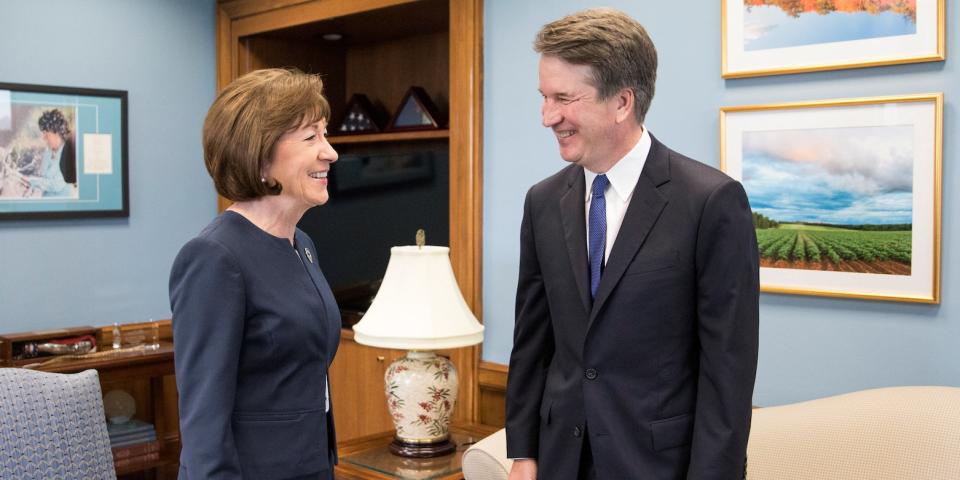Supreme Court nominee Brett Kavanaugh considers Roe v. Wade 'settled law,' Sen. Susan Collins says

Reuters
Maine Sen. Susan Collins met with Supreme Court nominee Brett Kavanaugh for two hours on Tuesday.
She says Kavanaugh told her that he considers Roe v. Wade, the landmark ruling that legalized a woman's right to abortion, "settled law."
Collins, who breaks from her party in being pro-choice, said she would not vote to confirm any nominee who expressed "hostility" towards Roe v. Wade.
U.S. President Donald Trump’s Supreme Court pick Brett Kavanaugh believes the landmark Roe v. Wade ruling that legalized abortion is settled law, according to Senator Susan Collins.
Collins, a Republican, spoke to reporters after meeting with Kavanaugh in her office for two hours on Tuesday.
"We talked about whether he considered Roe to be settled law. He said that he agreed with what Justice Roberts said at his nomination hearing, in which he said that it was settled law," she said. Settled law refers to a legal position that has been consistently upheld by judges.
Republican President Donald Trump nominated Kavanaugh, 53, on July 9 to replace retiring Justice Anthony Kennedy. Before Kavanaugh can assume the lifetime job on the nine-member court, the Republican-controlled Senate must vote to confirm him.
Trump promised during his campaign to appoint “pro-life justices” who would overturn Roe v. Wade, the 1973 ruling that legalized abortion nationwide. Speculation has centered on whether Kavanaugh, a federal appeals court judge with a solidly conservative judicial record, would vote to overturn a woman’s right to abortion.
Kavanaugh’s judicial record on abortion is thin, although last year he was on a panel of judges that issued an order preventing a 17-year-old illegal immigrant detained in Texas by U.S. authorities from immediately obtaining an abortion.

Reuters
Collins, a moderate Republican, has said that she could not support a nominee who had demonstrated “hostility” to Roe V. Wade. She is considered a key vote in the confirmation process, but she said Tuesday she will not make a decision until after Kavanaugh’s confirmation hearings, which start on September 4.
"I have always waited until after the judiciary committee hearings before rendering a final decision on a Supreme Court nominee. You never know what questions are going to come up," Collins said.
She is considered one of two potential swing votes, along with Sen. Lisa Murkowski of Alaska, who is also pro-choice. Kavanaugh is expected to meet with Murkowski later this month.
Collins said her conversation with Kavanaugh covered a wide range of issues, including abortion and guns and Kavanaugh’s "judicial philosophy." She called the meeting helpful, productive and informative.
Kavanaugh’s confirmation will require a simple majority in the 100-seat Senate, where Republicans hold a 51-49 edge over Democrats and independents. Senator John McCain, a Republican, is at home undergoing treatment for cancer, leaving Republicans no room for error if no Democrats support Kavanaugh. Vice President Mike Pence would vote if there is a tie.
However, conservatives are pressuring several Senate Democrats running for re-election in states that Trump won in 2016 to vote for Kavanaugh. Three Democrats voted to confirm Trump’s previous Supreme Court nominee, Neil Gorsuch.
See Also:

 Yahoo News
Yahoo News 
